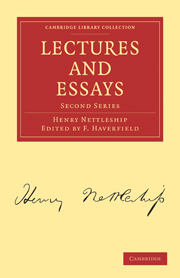Book contents
- Frontmatter
- PREFACE
- Contents
- Dedication
- MEMOIR BY MRS. NETTLESHIP
- I JOHAN NICOLAI MADVIG
- II THE ORIGINAL FORM OF THE ROMAN SATURA
- III LITERARY CRITICISM IN LATIN ANTIQUITY
- IV THE HISTORICAL DEVELOPMENT OF CLASSICAL LATIN PROSE
- V LIFE AND POEMS OF JUVENAL
- VI THE STUDY OF LATIN GRAMMAR AMONG THE ROMANS IN THE FIRST CENTURY A. D.
- VII ON THE PRESENT RELATIONS BETWEEN CLASSICAL RESEARCH AND CLASSICAL EDUCATION IN ENGLAND
- VIII THE MORAL INFLUENCE OF LITERATURE
- IX CLASSICAL EDUCATION IN THE PAST AND AT PRESENT
- X AUTHORITY IN THE SPHERE OF CONDUCT AND INTELLECT
- XI THE RELATIONS BETWEEN NATURAL SCIENCE AND LITERATURE
- BIBLIOGRAPHY
- INDEX
VII - ON THE PRESENT RELATIONS BETWEEN CLASSICAL RESEARCH AND CLASSICAL EDUCATION IN ENGLAND
Published online by Cambridge University Press: 05 October 2010
- Frontmatter
- PREFACE
- Contents
- Dedication
- MEMOIR BY MRS. NETTLESHIP
- I JOHAN NICOLAI MADVIG
- II THE ORIGINAL FORM OF THE ROMAN SATURA
- III LITERARY CRITICISM IN LATIN ANTIQUITY
- IV THE HISTORICAL DEVELOPMENT OF CLASSICAL LATIN PROSE
- V LIFE AND POEMS OF JUVENAL
- VI THE STUDY OF LATIN GRAMMAR AMONG THE ROMANS IN THE FIRST CENTURY A. D.
- VII ON THE PRESENT RELATIONS BETWEEN CLASSICAL RESEARCH AND CLASSICAL EDUCATION IN ENGLAND
- VIII THE MORAL INFLUENCE OF LITERATURE
- IX CLASSICAL EDUCATION IN THE PAST AND AT PRESENT
- X AUTHORITY IN THE SPHERE OF CONDUCT AND INTELLECT
- XI THE RELATIONS BETWEEN NATURAL SCIENCE AND LITERATURE
- BIBLIOGRAPHY
- INDEX
Summary
No acquisition of modern times is more remarkable than the nearer realization of the unity of spirit which pervades all research. Among a multitude of labourers in various fields of knowledge, there is a consciousness of a common aim, a common method, a common inspiration. This consciousness is no mere abstraction, but a living reality; the active pursuit of truth is a bond as strong as the bond of charity. And, while the widely-spreading love of truth is forming a new element of union among men, the objects of knowledge themselves are discovering more and more of their inner harmonies as their laws are read and verified by fresh experience. No branch of knowledge can now be seriously studied in isolation, or without a view to its actual or possible connexion with other branches, and the ultimate discovery of the simple principles underlying them all. This fact is obvious in the sphere of the humanities as well as in that of the natural sciences. Histories are studied for the sake of knowing history, languages for the sake of knowing language; and the studies of language and history are seen to be inseparably connected. Unities only guessed at or wrongly imagined before are disclosing themselves in their true aspect under the light of the comparative method. In this view it cannot be said of any ascertained set of facts that it is unfruitful or unworthy of further examination, or of any philosophical system, that it is final.
- Type
- Chapter
- Information
- Lectures and EssaysSecond Series, pp. 172 - 190Publisher: Cambridge University PressPrint publication year: 2010First published in: 1895



